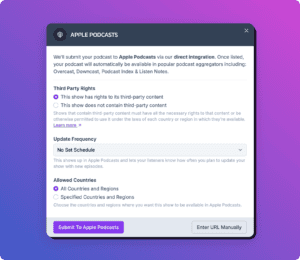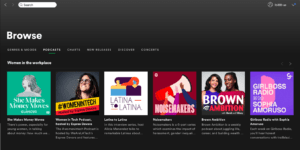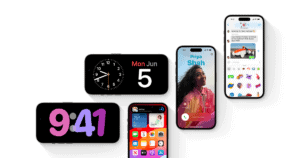Think back to the last time you browsed for a podcast to listen to. You probably picked an interesting category and explored whatever appeared on top. And you probably chose a show that was fairly close to the top of the list (at least in the top 100 of the Apple podcast charts). That’s how everyone browses, and it’s why iTunes podcast rankings are so important.
When we talk about iTunes podcast rankings, we’re referring to the way iTunes lists you within a category or subcategory. It looks like this…

That isn’t a random list. It’s a carefully contracting ranking based on multiple factors. An algorithm calculates each factor for each show to rank shows. The list changes constantly, though many of the shows at the top remain there for quite some time.
It’s no secret that podcasts that appear higher in the podcast charts get more listeners. As you gain a higher rank, you’ll enjoy two big benefits:
- Exposure – People are more likely to see your podcast, which makes them more likely to try it out. This effect increases as you get closer to the top of any given list.
- Credibility – If your podcast is at the top of the list, people assume it’s a high quality show. They’ll assume that other people must like it. Like exposure, this effect is also exponential. It increases as you get closer to the top.
Those are powerful effects that go a long way toward marketing your podcast. If you can score a top position in the iTunes podcast rankings, your show will grow organically, week after week, without much work on your end (except making quality content, of course).
But first, if you want to boost your iTunes podcast rankings – and hopefully make it to the top – you need to understand how the algorithm works.
A Quick Disclaimer About iTunes Podcast Rankings
Before we dive in, it’s important that we make a few things clear: We don’t know for sure how iTunes podcast rankings work. Not with 100% accuracy, at least, because Apple has never disclosed how their formula works. And they never will, most likely, otherwise savvy marketers would abuse the system to game the Apple podcast charts and make the whole thing worthless.
Furthermore, iTunes doesn’t show every user the same rankings. Like Netflix, iTunes customizes its recommendations based on each users preferences. There isn’t a massive amount of variety, however, especially when you drill into subcategories, but your iTunes may not look the same as your friends’ iTunes.
Finally, getting into a special list is different than ranking well in your category. This includes the New & Noteworthy sections (there’s one for every category and subcategory) and Features Collections.
iTunes Podcast Rankings Factors
While we don’t know everything about how iTunes ranks podcasts, here are some factors we know influence your iTunes podcast rankings. If you can boost these factors, you’ll have a good chance of moving up the podcast charts.
(Keep in mind: These factors apply to the Podcasts app as well – the one that comes with every Apple device. iTunes will aggregate each factor on both platforms. So don’t worry if you get most of your plays on the Podcasts app. That data will influence your iTunes podcast rankings too.)
1. Downloads
As you can expect, downloads are one of the most important metrics that affect your iTunes podcast rankings. A download is a strong signal that someone likes your show. If someone is willing to fill their precious device space with your episode, they must like your show.
2. Plays
Plays, like downloads, are another strong indicator that people like your show, whether they occur in iTunes or the Podcasts iOS app.
There’s also some speculation that repeated plays help as well. This is when the same person listens to the same episode multiple times. Repeated plays indicates that the listener found the episode so valuable that they had to come back again.
3. Subscriptions
Subscriptions are another powerful factor because they mean the listener is invested in the podcast and wants to know when the next one becomes available. What’s nice about this factor is that it helps you between episodes.
4. iTunes Ratings
iTunes ratings are great sources of listener feedback, so they are likely taken into consideration for iTunes podcast rankings. The number and value of iTunes ratings are key here. Podcasts with lots of four- and five-star iTunes ratings signal quality. Podcasts with low ratings indicate poor content. Podcasts with no ratings are unproven.
The best way to get more ratings is to simply ask for them. Teach your listeners how to rate a podcast on iTunes. Explain the steps in detail so they can leave a rating without much hassle.
5. Reviews
Reviews are definitely a factor for your iTunes podcast rankings, but we aren’t sure how much. While it’s possible for algorithms to read text, it probably can’t do it in a way that’s reliable enough to rank podcasts. So we don’t think the algorithm puts much weight on these.
That said, reviews are extremely important tools for convincing potential listeners to try your show. Make sure to ask for reviews during every episode. Just like you taught them how to rate a podcast on iTunes, teach them how to leave a review as well.
6. Artwork
ITunes has high standards for podcast cover artwork. They don’t want their site and apps full of cheesy, unprofessional art. So part of their algorithm undoubtedly considers quality of each cover art. Of course, art is subjective, so their algorithm can’t do everything. But it is possible for an algorithm to judge quality like contrast, clarity, and text legibility.
7. Podcast Data
Your podcast data includes all of the information you send to Apple when you submit your podcast to iTunes. These have minor effects on your iTunes podcast rankings. However, these are the only factors you can influence directly, so make sure to get them right.

Category – Your category is the most important data point to include when you submit your show do iTunes. It’s important to include yourself in the correct category. iTunes will rank you lower if it doesn’t think you are relevant in that category. Plus, listeners will have a hard time finding your show if you aren’t in the category they expect.
Description – iTunes reads the copy in your show’s description and uses the keywords you include as a ranking factor. For instance, a show in the Business>Entrepreneur category that uses the word “entrepreneur” in the description may receive a higher rank than a show that neglects that word. The description is also important for search. When someone searches for a keyword, shows with that key word in the description are more likely to appear higher in the search results.
Explicit – If your podcast is listed as explicit, it will not show up in the rankings (or anywhere, for that matter) of accounts with explicit content restrictions. So if a mom or dad turns on this control for their kid’s account, the kid will never see your show.
Language – iTunes shows podcasts to users that are in their preferred language. If you select the wrong language, your show won’t be available to the listeners you intend to reach. Ultimately, this means fewer plays, subscribers, downloads, ratings, and reviews.
iTunes Podcast Rankings Editorialization
At the end of the day, iTunes is owned by a private organization. Apple has complete control over what appears on iTunes and in what order. They can remove your show entirely for any reason. It wouldn’t be good publicity for them to ban podcasts that don’t violate their standards, but they always have that power.
This also means they can adjust their rankings any way they see fit. They can add an unpopular podcast to the New & Noteworthy category if they wanted. They can move you up or down the Apple podcast charts at their whim.
Does iTunes do this often? Probably not. But since we don’t know exactly how would their algorithm works, it’s impossible to prove whether they do or don’t. It wouldn’t be unreasonable for them to push a new show to the top because they suspected will be popular, or boost the ranking have one of their partner brands.
What This Means for You
Now that you understand how iTunes podcast rankings work, you’re probably anxious to boost your own. While it’s important to take your ranking seriously, there’s little you can do to game the system because your ranking depends almost entirely on user behavior. You need your listeners to take action on your behalf.
This means that the best you can do for your iTunes podcast ranking is encourage your listeners to subscribe, play your episodes (especially on the day you release), download for later, and leave iTunes ratings and reviews. The more positive signals they send to iTunes, the higher your show will rank.


